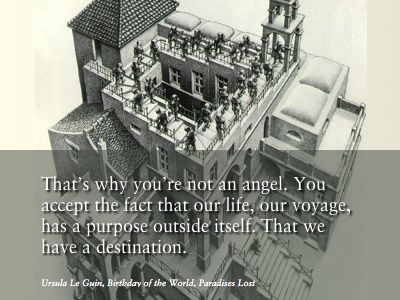
In Birthday of the World, which is one of my favourite stories by Ursula Le Guin, a ship, called the Discovery, is travelling to explore the Earth’s nearest star and to colonise a planet there. The star is a long way away, so they’re on a generation ship—that is, the 6th generation of people living on there will arrive. They live in contained space: A single room is 960 cubic feet, and has moveable partitions so families can decide how to arrange it themselves.
Of course, they’ve no idea what shoes are—their world is carpeted. There’s no disease. The educational system is formed so that the middle generations aren’t taught how to survive at the final planet. Why should they know, and wouldn’t it damage them psychologically if they had to encounter the fact they’ll die without fulfilling their purpose every day of their lives?
There are no religions. Recycling is paramount. You never go outside the ship. It’s a closed system.
Le Guin’s genius is to extend the factors that mean recycling is paramount to the personal. Out of living within this world, a kind of coping system arises. How do you find meaning in your life? The new system of believe is called Bliss, and believers are called Angels. One of the characters is describing to another why she (the other) isn’t an angel:
“That’s why you’re not an angel. You accept the fact that our life, our voyage, has a purpose outside itself. That we have a destination.”
Bliss leads to denial of the destination and tragedy, in the end. At a time where we’re rediscovering the adage that “the journey is the destination,” Le Guin is looking past and asking what happens next.
My last few slides have all been about closed systems, and networks which act to close themselves. It feels odd, but we’re about to reach that period on our own planet. Every day, we’re having encounters with limits in places where technology, before, was all about extending them. (I’ve heard Malcolm McCullough describe modernity as when you send more boats out fishing and get more fish back, and postmodernity as a confrontation with limits—you send out more boats, and there are less fish to bring back.)
In the closed-system world, there’s no room for side-effects and pollution any more. We have to take care about closing all cycles. And our world is about to become a closed system.
(More links to my writing: I’ve previously referred to side-effects, using Geoff Cohen’s satellite example, and considered recycling as emergent from a space-age closed-cycle worldview.)